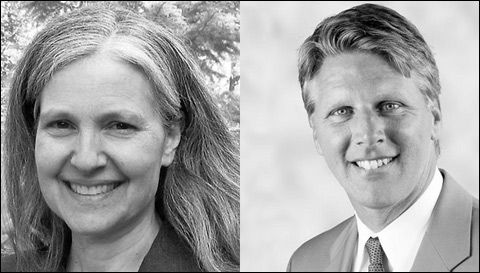
THIRD WHEELS: Neither Tim Cahill (right) nor Jill Stein has made much progress with their independent run for governor. |
There's a message in how Governor Deval Patrick and Charlie Baker laugh off Tim Cahill's venom in the gubernatorial debates: neither Republicans nor Democrats are sweating their Independent rival in the 2010 election. Even if Cahill reminds voters of former Governor Ed King, the Reaganite Democrat whose selective populism was once a mainstream Massachusetts religion.
Nor are the front-runners concerned about Green-Rainbow candidate Jill Stein, whose indictment of Beacon Hill lobbyists has only resonated with five percent of polled voters. Stein, a physician and activist who won 3.5 percent of the vote in her 2002 bid for governor, presumably represents stubborn anti-establishmentarians who have given up on politics but not on voting.
However, regardless of who wins in November, partisans like Baker and Patrick should watch their backs for third-party spoilers in the future. As the country increasingly polarizes, Massachusetts voters are nearly four times more likely than average Americans to register as "unenrolled," according to Gallup and current party identification numbers. Next to Maine and perhaps Vermont (see "The Independent Herd," thePhoenix.com), with the latter's socialist lion Senator Bernie Sanders, the commonwealth may be the most independent state in the union.
There's been a recent storm of national chatter about right-wing proclivity to think outside the two-party system. (That despite the fact that two major conservative success stories, Christine O'Donnell in Delaware and Joe Miller in Alaska, are running for the US Senate as Republicans.) But here in liberal Massachusetts, an independent movement was flourishing long before Glenn Beck put the sexy back in ideological liberation.
And this local nonpartisan threat is gaining ground. In addition to Scott Brown's US Senate win, for which independents were largely credited, this election cycle, 65 third-party or Independent candidates submitted signatures to enter races statewide. Compare that with less than 25 in 2008. Considering that roughly half of commonwealth voters decline party affiliation (as they have for more than 50 years), candidates who aren't complete whack jobs have increasingly better odds, so long as they can raise money and attract volunteers.
Promise and symbolic successes aside, though, one dynamic impeding a full-blown indie-pol revolution may be that our leading fringe candidates are often INOs (Independent in Name Only). Much like Cahill, who defected from the Democratic Party for strategic purposes last year, 2006 independent hopeful Christy Mihos was a Republican through the primaries, and reverted back following the race. (It should be noted, however, that Mihos still took nearly seven percent of the gubernatorial vote — more than any third wheel in recent state history.)
It's hard to win when the state constitution is rigged in favor of party interests. But trends rarely lie, and there are several indications that this famously blue stronghold is slowly turning more purple with each election, and is doing so with a fervor that won't likely erode when nationwide anti-party hysteria falls out of fashion.